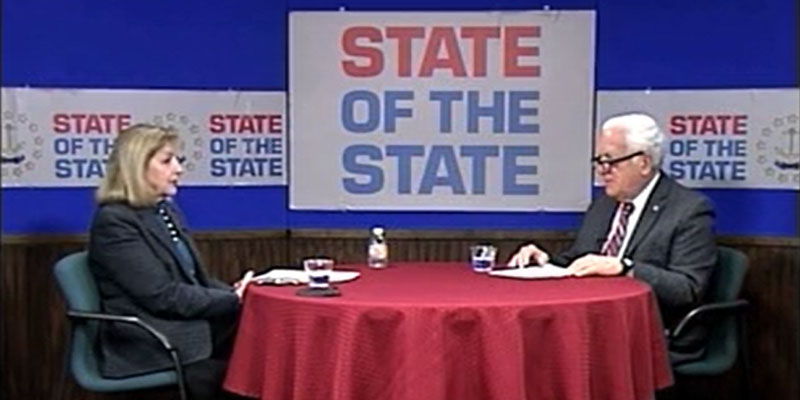Because Democrat Governor Dan McKee has been so broadly disappointing from a moderate-to-conservative perspective, this is encouraging news:
For the first time in the state’s history, a Rhode Island governor has officially recognized the last week of January as “Rhode Island School Choice Week.” Gov. Daniel McKee recently signed a proclamation recognizing School Choice Week (Jan. 23-Jan. 29) and how every Rhode Island child deserves an effective education.
The link goes to a PRNewswire story, which means it’s a generic story that a public relations team has written for any news organization that subscribes to the wire. What’s strange is that I’ve only come across the story, or its “historic” content, at organizations in Idaho (KPVI, linked above) and Texas (in the Kilgore News Herald).
Maybe our local news organizations in Rhode Island just haven’t gotten around to posting the story yet because they intend to do some original reporting to make a feature out of it. Or maybe, on behalf of the state’s most-powerful special interests, they don’t want to make school choice seem like a normal thing that people across party lines and ideological divides support and that might offer disadvantaged communities a way out of the systemic racism of progressive governance.
[Open full post]Here’s a line worth teasing out from Ted Nesi’s latest roundup column:
NEARI union leader Bob Walsh said he is considering a run, adding, “I am also weighing what is best for the Democratic Party to keep this seat in Democratic hands.”
Yes, the answer is obvious, but it’s worth pausing to ask: Why is the head of a teacher union in the news expressing overriding concern for the interests of a particular political party? To ask is to answer. Perhaps that’s why the local media never asks.
[Open full post]It doesn’t make much sense to me. We’ve got a small state that isn’t terrible for traffic, despite being densely populated. You’d think local authorities could keep the roads in order.
But there it is: According to WalletHub, the Ocean State is the second-worst state for drivers in the country, after Hawaii.
- Cost of Ownership & Maintenance: 4th worst
- Traffic & Infrastructure: 4th worst
- Access to Vehicles & Maintenance: 5th worst
If it weren’t for the 7th best safety, we’d certainly be dead last.
[Open full post]Looking for something to do at The Vets in Providence one of these weeks?
Tickets are widely available for the Rhode Island Philharmonic’s performance of Scheherezade on Saturday, February 12. Angelique Kidjo the next evening? Pick your section. The next weekend, the multiple shows of Trolls Live! have plenty of seats available. If you’re in the mood for some comedy, Tim Dillon can fit you in any section except right in front of the stage on Thursday, February 24.
But if you’re interested in hearing a lecture by Canadian psychology professor Jordan B. Peterson on February 17, find yourself a scalper, unless you can morally claim the very last wheelchair space (with companion).
Even stranger than the fact that a conservative academic like Peterson would have the hottest tickets in Democrat-dominated Rhode Island is the fact that nobody seems to be noticing. It’s been a big story in the Ocean State, recently, that the increasingly radical University of Rhode Island revoked largely ceremonial honorary degrees previously bestowed on Rudy Giuliani and Michael Flynn, but here’s a professor who just published an essay renouncing his prestigious fully tenured professorship at the University of Toronto who is selling out speaking engagements in midsized performance venues even in New England, and somehow that’s not a story.
But what a story it is! If you’re not aware of the Peterson phenomenon, you can’t possibly understand even half of what is going on in our society right now.
In a nutshell (and with a little bit of my own, ahem, interpretation), progressive education and media have left several generations so insecure and deprived of meaning that a psychology professor who put his foot down against compelled radical speech and then began publishing books describing “rules for life” became one of the most famous people on the planet.
Rhode Island journalists will inform the public when some third-tier Democrat spins through the state to collect donations from wealthy partisans. One might think — if one weren’t paying attention — they’d be scrambling for tickets and backstage access to catch a hint about why one of our state’s major venues is sold out this particular Thursday night in February.
Featured image of the Veterans Memorial Auditorium.
[Open full post]Current Legislation, Concerns & Issues (1/10/22) from John Carlevale on Vimeo.
Host Richard August reviews with Representative Susan Donovan recent legislation and current concerns and issues of the past legislative session. This includes pay equity, a privacy bill relating to health care, child opportunity centers, gender conversion therapy for minors, affordable housing, the safe school act, non-gender specific rest rooms, the nursing home equity staffing act, an African American history curriculum and more.
[Open full post]Not mentioned in the stories about Governor Dan McKee’s delay of the new nursing home staffing mandates is that they are arguably the most-extreme minimum standards in the world. Imposing new mandates in the middle of a nurse-staffing crisis is simply insane. Holding off these mandates would be considered an obvious thing to do in any community that is (1) sane and (2) not completely controlled and placed in the service of labor unions.
The fact that our legislators wouldn’t do the obvious is not, however, the most maddening aspect of this situation. No, that award goes to the fact that the governor is making this change, in my view, illegally, by invoking his enhanced emergency powers… which the General Assembly has been content to accept when it saved them from taking responsibility.
Ultimately, that’s the most important thing. The governor should let these mandates go into effect so that our “representatives” can get what they wanted… and pay the price because of the disaster they would have obviously caused.
Eventually, we need voters to be able to see just what damage they’re doing with their votes.
[Open full post]
Ed Del Grande describes the bathroom of the future.
Featured image by Marc Schaefer on Unsplash.
[Open full post]You know, it’s difficult not to laugh at the computer screen when reading something like this in January 2022:
Massachusetts has a new way of how they are reporting COVID-19 hospitalizations to differentiate between what they are calling “primary” and “incidental” cases.
The state is now reporting the difference between patients who were admitted for the virus, or who came in for other illnesses and ended up testing positive. …
As of the first day of differentiating between hospitalizations on Thursday, the state reported 52.2% of patients were there because of the severity of the virus, while 47.8% were there for other illnesses and tested positive.
Naturally, Melanie DaSilva’s WPRI article makes no mention of the fact that skeptics of the government’s response to the pandemic have been insisting on this distinction for years, now.
As a reminder, I went back and found the post I wrote in April 2020 when Democrat Governor Gina Raimondo’s administration revised its COVID hospitalization numbers according to a new, “streamlined” reporting tool. The change brought a 25% increase in the count of hospitalizations, and although it took a few days, my original guess proved correct: the state had started including people admitted to the hospital and testing positive whether COVID was the reason they were there or not. Conspicuously, as I noted at the time, the change in methodology came with a shift in the mainstream narrative, from insisting that hospitalizations were the key metric to watch to a count of “cases.” Coincidentally, hospitalizations had started going down before the change.
Ever since, Rhode Islanders have had no way of knowing how much of our pandemic consisted of people with mild or no symptoms who happened to be tested for some reason. (Not to be conspiratorial or anything, but you might recall that the intervening months brought a couple national elections with objectionable changes to the system, favoring Democrats and pushed through as a response to the contagion.)
We don’t have to go all the way to talk about a “plandemic” to see the importance of remembering the history. COVID hit, and governments seized enhanced power, escalated on a ratchet, particularly with “two weeks to flatten the curve.” When hospitalizations began to recede, Rhode Island made its count less accurate, and ever since, we can reasonably conclude, we’ve been overcounting hospitalizations because of COVID-19 by 25–50%.
Now that the politics have changed, the narrative is changing, too, taking up some of the more-reasonable perspectives that many of us have been demanding all along.
Featured image by Amirr Zolfiqari on Unsplash.
[Open full post]Rhode Islanders won’t be surprised that former State Police Colonel and gubernatorial candidate Brendan Doherty is considering a run for Congress now that incumbent Representative James Langevin has announced the opening. Here’s the interesting wrinkle, though:
This time around, Doherty is considering entering the Democratic primary for the 2nd District, which covers western Rhode Island. Langevin, a Democrat, first won the seat in 2000.
The record shows Doherty became a non-Republican in 2014 and then a Democrat in 2015, so this isn’t an opportunistic choice, and his switch wasn’t a response to Donald Trump. Still, whatever else it is, Doherty’s party decision right now is a political calculation, and it’s an interesting one.
Whatever his party, the expectation would be that he’d be running in the conservative lane (okay, okay… “moderate”). In the primary, he’ll surely be facing off against fellow Democrats far to his Left. Even if the machine clears his path among those who play along, the Matt Brown wing will seek to get some mileage from a run, which would bruise Doherty for the general election. Doherty will be running as a former cop in a party still in the grips of a “defund the police ideological” hot-flash.
Then, if he takes the primary, he’ll have to face up against a Republican, perhaps as credible as Allan Fung — who, in Fung’s case, may have more inroads with progressives than expected thanks to his General Assembly wife’s radicalism. Of course, rifts in the state GOP may cost Fung some of his party’s base, giving Doherty establishment Democrats, Ken Block’s old Moderates, and a big chunk of the GOP willing to switch parties for one box on the ballot in the hopes of having a Manchin-like representative in a Congress that’s likely to switch to Republican control.
However much this speculation may prove accurate, the complexities don’t feel healthy. Rhode Island is struggling with a mixture of the reality that Democrats all but sweep the elections and the difficulty of knowing where one belongs based on beliefs. No non-progressive voter can reliably use party identification to know reasonably well whether he or she is electing somebody who’ll work to move policies toward his or her preferred outcome.
Progressives are the exception because vanishingly few of their candidates would dare accept an “R,” and their ideology has such strength in the Democrat Party that empowering it serves their interests at least a little. But moderate-to-conservative Democrats can’t be sure that a straight-party vote won’t elect radicals, and Republicans might miss a Democrat-in-name-only opportunity by sticking with a Republican who (let’s remember) probably had no competition and therefore minimal screening to get on the ballot.
Whether or not Doherty’s choice of party for this race works out for him, Rhode Island needs to find a way back to a condition in which a candidate like him would be a Republican.
[Open full post]Brad Polumbo writes:
Few causes are as central to the progressive movement as student debt “cancellation” (which really means taxpayers absorb the burden of $1.7-plus trillion in student debt). But yet another study just confirmed that there’s actually nothing “progressive” about student debt cancellation at all.
A new analysis from the liberal-leaning Brookings Institution finds that “almost a third of all student debt is owed by the wealthiest 20 percent of households and only 8 percent by the bottom 20 percent.”
The issue has a strange feel, once scratches the surface of analysis. Some significant percentage of the benefit would go to wealthy families for whom college was an easy matter of course. Some significant percentage would go to people who made an investment in higher education, and it was successful. Some percentage took out loans to buy useless degrees.
The only advantage to the blanket loan-cancelation policy is that it buys votes for lefitsts.
[Open full post]







